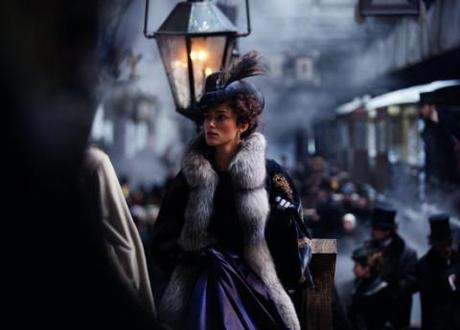 Keira Knightley as Anna Karenina. Photo Credit: Working Title Films.
Keira Knightley as Anna Karenina. Photo Credit: Working Title Films.
The background
Joe Wright’s eagerly anticipated reimagining of Anna Karenina stars Keira Knightley, Jude Law and Aaron Taylor Johnston and places the adulterous action entirely within the confines of a 19th century theater. Based on Leo Tolstoy’s classic novel, it tells the tale of a married socialite in 19th century Russian high society who embarks upon a passionate affair with catastrophic consequences.
An inspired vision
Wright took a huge risk in his theater setting but, according to some critics, it appears to have paid off. Empire called the film “spellbinding” and “period drama at its most exciting.” It also had heady praise for Wright: “[T]his is really its director’s movie. Bold, imaginative, thought-provoking and passionate, Anna Karenina puts Wright at the forefront of filmmaking in Britain. Or anywhere.” The Independent, though largely sceptical of the concept, does concede, “His technical confidence is never in question. Whether we like his effects or not seems beside the point; if Wright wants to do something, whether it’s horses racing across a stage or a long tracking shot of a routed army (the Dunkirk sequence in Atonement), he’ll damn well do it. He takes risks, plays with form, and you take your hat off to him.”
‘A failed experiment’
Not everyone, it seems, was as enamoured with Wright’s directorial choice. The Daily Mail called Anna Karenina “as exquisitely framed as a Vogue fashion shoot — and as unmoving… while it’s exquisite to look upon, it’s fatally low on feeling and high on a sense of its own intelligence.” Indeed many critics have noted that Wright’s theatrical setting, whilst visually arresting, sacrifices the emotional content of the novel. The Independent called it a “perverse decision” akin to “designing a car and then equipping it with a set of wooden wheels.” It accuses the film of betraying the heart of Tolstoy’s classic: “as to why Anna Karenina ranks as a novel, perhaps the novel, of the ages, this film does not give a clue” and The Telegraph concurs by observing that it “threatened to upstage Tolstoy entirely.” The Evening Standard’s David Sexton was almost overwhelmingly critical of the film’s concept: “[T]he outcome is to make this great realist novel wholly artificial and relentlessly stagey in the worst sense… Everybody here acts up all the time. You don’t believe it for a minute.” He called it a “failed experiment” and declared, “Anna Karenina is so much better suited to be a leisurely, flowing TV serial than this rattling parade of telling postures and smart one-liners.”
Divisive performances – though Taylor-Johnson roundly disliked
The central performances are proving as divisive as the film’s concept. The Telegraph praised Knightley’s portrayal of Anna as “a headstrong, inescapably actressy creation, full of fussy vitality and verve. It’s clear that she thrives under Wright, and the emotional demands of this role bring out an intriguing combination of masculine certainty and bitter regret.” However The Independent believes “She hasn’t that self-forgetting capability of a great actor to encompass Anna’s anguish, or her soulfulness.” Critics were, however, seemingly united in their criticism of Aaron Taylor-Johnson’s Count Vronsky. The Evening Standard called him “a chinless wonder” and The Telegraph observed, “It’s hard to watch Wright’s version without wondering what might have been, if only Knightley had a worthier scene partner than Aaron Taylor-Johnson… she’s willing to sacrifice everything for this wooden twerp?”
More in film
- The wait is nearly over for Anna Karenina
- The Master is a landmark American movie
- Lawless not flawless
- Eerie, brilliant The Imposter is one of the best films of the year

